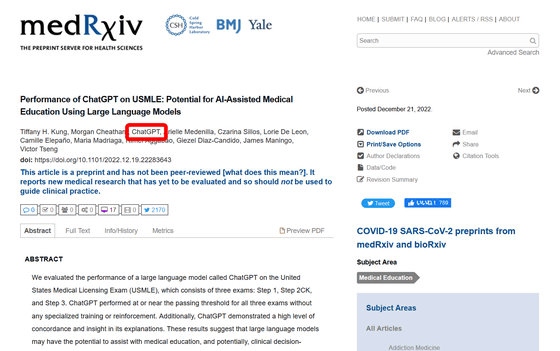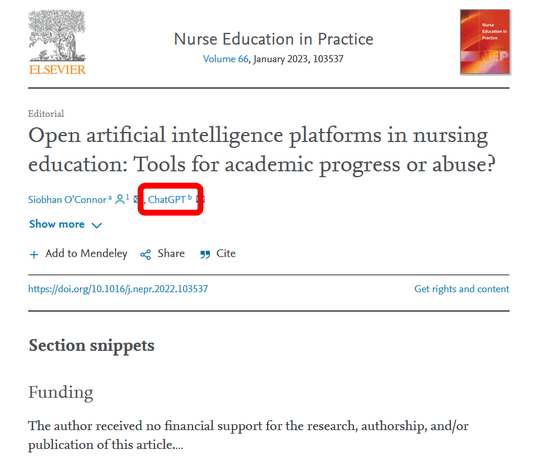Publishers and research repositories object to ChatGPT being listed as an author on research papers

ChatGPT developed by OpenAI is based on the derivation of GPT-3, a language model that generates natural sentences like those written by humans with high accuracy. It is possible to have a conversation as naturally as it feels. The academic journal Nature reports that a paper in which ChatGPT is named as an author has already appeared.
ChatGPT listed as author on research papers: many scientists disapprove
https://www.nature.com/articles/d41586-023-00107-z
Already, at least four cases of AI such as ChatGPT being credited to authors of research papers have been identified.
For example, ChatGPT is listed as one of the authors of an unpeer-reviewed article submitted to medRxiv, a medical article repository. The paper was to evaluate the performance of ChatGPT using the American Medical Licensure Examination.
Performance of ChatGPT on USMLE: Potential for AI-Assisted Medical Education Using Large Language Models | medRxiv
https://doi.org/10.1101/2022.12.19.22283643

The management team of medRxiv and its sister repository bioRxiv are discussing whether it is appropriate to include ChatGPT in the author name when using AI tools when writing research papers. Richard Sever, co-founder of medRxiv, said, ``The author of an academic paper must be distinguished from the author in the general sense of 'writer of text.' Only people should be listed because they are responsible.' Of course, there have been examples in the past where pets and fictional characters have been listed as authors in academic papers, but ``it's just a matter of checking, not a matter of rules,'' Sever said.
ChatGPT also co-authored a paper titled “Open Artificial Intelligence Platforms in Nursing Education: Academic Advancement or Abuse?” published in the January 2023 issue of the academic journal Nurse Education in Practice. credited as. However, according to Roger Watson, editor-in-chief of Nurse Education in Practice, this credit was incorrectly stated.
Open artificial intelligence platforms in nursing education: Tools for academic progress or abuse? - ScienceDirect
https://doi.org/10.1016/j.nepr.2022.103537

Many academic journal publishers, including Nature, say that ``AIs such as ChatGPT do not meet the criteria for research authors because they cannot take responsibility for the content and integrity of academic papers.'' Magdalena Skipper, editor-in-chief of Nature, commented, ``The author has accountability for the paper, but this cannot be applied to the language model AI,'' and if you used AI, how to use it should be described in the method description or acknowledgments section of the paper.
“We do not allow AI to be listed as the author of a paper, and using AI-generated text without proper citation is considered plagiarism,” said Holden Thorpe, Editor-in-Chief of Science. I think it could be viewed,' he said.
The board of directors of arXiv, an unpeer-reviewed article repository, has been discussing it internally. Astronomer Stein Sigurdson, arXiv's scientific director, supports the opinion that ``software such as AI cannot agree to terms of use or distribute content, so it cannot be the author of a submitted paper.'' At the time of writing the article, ChatGPT's author's paper is not registered in arXiv, but Mr. Sigurdson says that he plans to publish guidance for paper authors in the near future.
Alex Zaboronkov, CEO of Insilico Medicine, a Hong Kong pharmaceutical company, said that he is developing AI-based pharmaceuticals as a business and at the same time has published more than 80 papers using AI. And in the paper (PDF file) published in 2022, ChatGPT is credited as a co-author of the paper. According to Zaboronkov, if you ask ChatGPT the same question many times, you may get a different answer. ``I'm worried that AI will be abused in the academic world,'' said Zaboronkov.
Related Posts:







